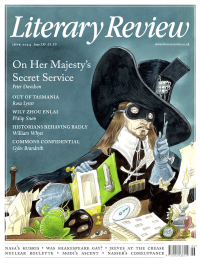Philip Snow
China’s Great Survivor
Zhou Enlai: A Life
By Chen Jian
Harvard University Press 841pp £29.95
Few modern political leaders have been more versatile than Zhou Enlai. A journalist and recruiter in Paris in the early 1920s for the infant Chinese Communist Party (CCP), he reappeared repeatedly over the next few decades: as director of political affairs for the National Revolutionary Army set up to rid China of its warlords; as the spymaster managing the CCP intelligence network after the rift between the CCP and the Chinese Nationalist Party in 1927; as the Red Army’s chief decision-maker during the celebrated Long March; as the CCP’s representative in dealings with the Nationalists and foreign envoys during the Japanese invasion of China; as premier of the new People’s Republic of China (PRC) from 1949 until his death in January 1976. A life of Zhou Enlai, in other words, can be nothing less than an exploration of China’s history during the greater part of the 20th century. Chen Jian has drawn on such an astonishing wealth of sources in Chinese archives and elsewhere that it is difficult to see how his biography could ever be bettered.
Much of Chen’s book presents Zhou as the benevolent statesman whom people both within and beyond China have been accustomed to visualising over the years: the habitual moderate of Mao Zedung’s regime, reconciling factions and sometimes stepping in to protect potential victims of Mao’s political campaigns. In 1967, we are told, at the height of the Cultural Revolution, he faced down an extremist mob clamouring for the head of the foreign minister, Marshal Chen Yi, declaring that they would drag Chen away for denunciation over his dead body. He is said to have taken equal care to safeguard some of China’s most precious historical treasures, deploying a garrison in the Forbidden City to prevent that magnificent palace complex being torn down as a useless remnant of the ‘old’ culture. On another occasion he received a deputation of Mao’s fanatical Red Guards and explained to them patiently why their plan to switch the traffic lights in Beijing to make green stand for stop and red for go might not be a good idea. After the premier died in 1976, hundreds of thousands of ordinary Chinese citizens poured spontaneously onto the streets and wept.
Zhou likewise emerges from this book as the consummate diplomat, courting the United States envoys who made their way to Chongqing, the wartime capital of China, fleshing out the alliance between the new PRC and the USSR in Moscow in 1950, securing the French withdrawal from Indochina, winning the acceptance

Sign Up to our newsletter
Receive free articles, highlights from the archive, news, details of prizes, and much more.@Lit_Review
Follow Literary Review on Twitter
Twitter Feed
Under its longest-serving editor, Graydon Carter, Vanity Fair was that rare thing – a New York society magazine that published serious journalism.
@PeterPeteryork looks at what Carter got right.
Peter York - Deluxe Editions
Peter York: Deluxe Editions - When the Going Was Good: An Editor’s Adventures During the Last Golden Age of Magazines by Graydon Carter
literaryreview.co.uk
Henry James returned to America in 1904 with three objectives: to see his brother William, to deliver a series of lectures on Balzac, and to gather material for a pair of books about modern America.
Peter Rose follows James out west.
Peter Rose - The Restless Analyst
Peter Rose: The Restless Analyst - Henry James Comes Home: Rediscovering America in the Gilded Age by Peter Brooks...
literaryreview.co.uk
Vladimir Putin served his apprenticeship in the KGB toward the end of the Cold War, a period during which Western societies were infiltrated by so-called 'illegals'.
Piers Brendon examines how the culture of Soviet spycraft shaped his thinking.
Piers Brendon - Tinker, Tailor, Sleeper, Troll
Piers Brendon: Tinker, Tailor, Sleeper, Troll - The Illegals: Russia’s Most Audacious Spies and the Plot to Infiltrate the West by Shaun Walker
literaryreview.co.uk